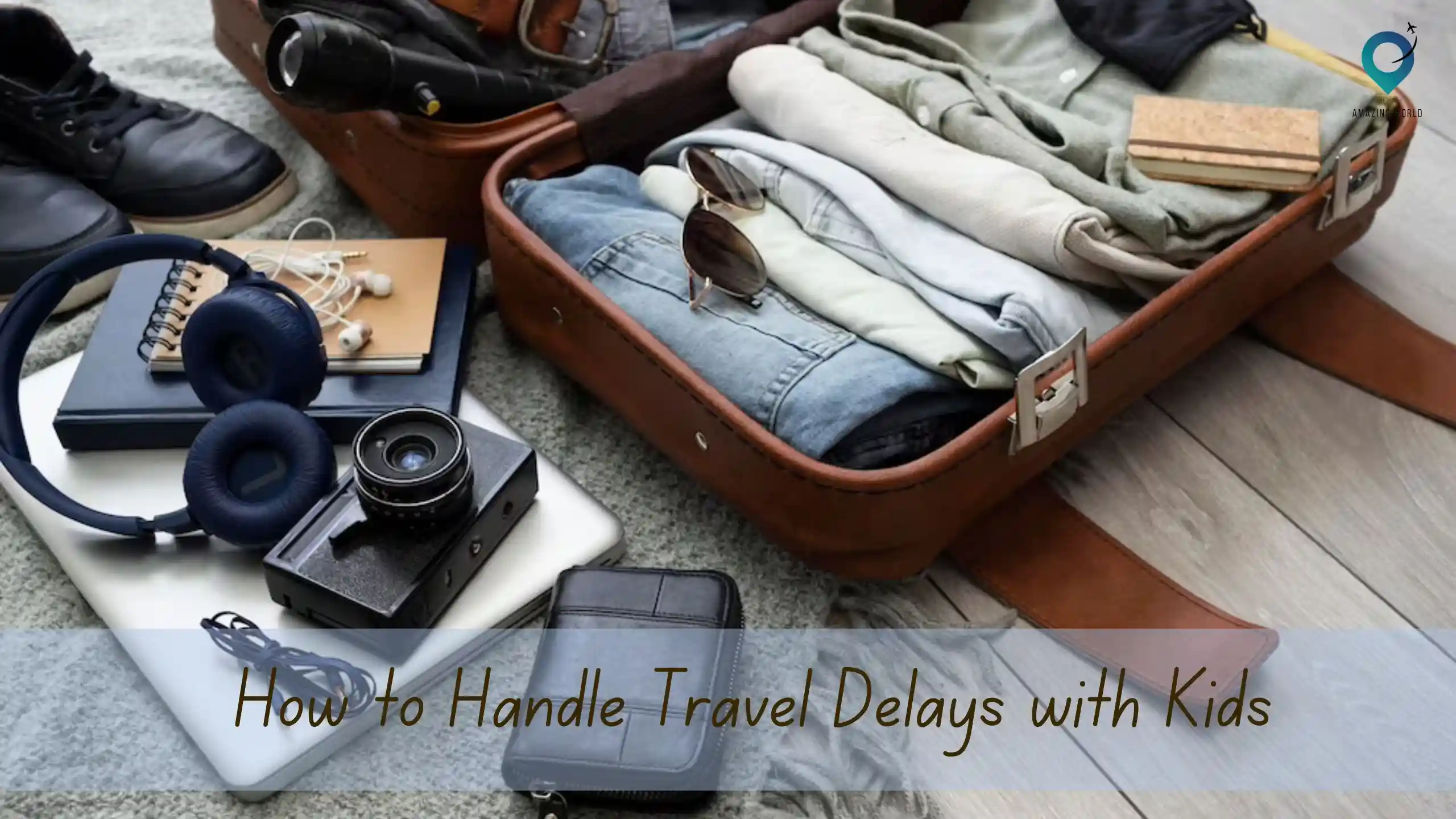How to Handle Travel Delays with Kids
Table of Contents
Toggle
Traveling with kids can be a joyful and exciting experience, but it can also bring its fair share of challenges, especially when faced with unexpected travel delays. Handling these situations effectively becomes crucial to ensure a smooth and enjoyable journey for the entire family, whether it’s a flight delay, a missed connection, or a long layover.
In this article, we will explore practical strategies and tips for handling travel delays with kids, turning what could be a frustrating experience into a memorable adventure.
Understanding the Challenges of Traveling with Kids
Before we delve into the strategies for handling travel delays, it’s essential to understand the unique challenges that come with traveling with kids. Young children have limited patience and often struggle with changes in their routines and environment. Travel delays can exacerbate their restlessness, leading to tantrums, frustration, and added stress for parents. By acknowledging these challenges, we can better prepare ourselves to tackle them head-on.
Common Causes of Travel Delays
Travel delays can occur due to various reasons, and it’s important to be aware of these common causes to better understand and prepare for potential disruptions. Here are some of the most frequent factors that contribute to travel delays:
- Adverse Weather Conditions: Inclement weather, such as heavy rain, snowstorms, fog, or strong winds, can significantly impact travel schedules. Airlines prioritize passenger safety, and if weather conditions make flying unsafe or affect visibility, flights may be delayed or canceled.
- Air Traffic Congestion: Busy airports and congested airspace can lead to delays, especially during peak travel seasons or in highly populated areas. Increased air traffic can result in longer waiting times for takeoff and landing clearance.
- Technical Issues: Mechanical problems with the aircraft or other technical issues can cause flight delays. Airlines prioritize the safety and maintenance of their aircraft, and if any mechanical issues arise, it may result in delays as the problem is assessed and resolved.
- Crew Availability: Delays can occur if there is a shortage of flight crew members. Airlines need to comply with crew rest regulations to ensure their well-being and performance. In some cases, unexpected changes or absences in the crew roster can lead to delays while replacements are arranged.
- Airline Schedule Changes: Airlines occasionally make schedule adjustments to optimize operations, accommodate maintenance requirements, or respond to market demand. These changes can result in rescheduled or delayed flights, affecting passengers’ travel plans.
- Security Procedures: Enhanced security measures implemented by airports or authorities may result in longer queues and processing times during check-in, security screenings, and passport control. These security procedures are in place to ensure the safety of all passengers and may lead to travel delays.
- Airline Operational Issues: Airlines may experience operational challenges such as operational disruptions, crew or staff shortages, or issues with ground services. These internal factors can impact the timely departure and arrival of flights.
- Unforeseen Events or Emergencies: Unforeseen events, such as natural disasters, political unrest, or airspace closures, can lead to travel disruptions and delays. These situations are beyond the control of airlines and often require adjustments to travel plans.
It’s important to note that while these causes contribute to travel delays, airlines and airport authorities strive to minimize the impact on passengers. They prioritize safety, provide regular updates, and work diligently to minimize inconvenience during such situations.
Impact of Travel Delays on Kids
Travel delays can have a significant impact on children, both emotionally and physically. Understanding these effects is crucial for parents and caregivers to provide the necessary support and help children cope with the challenges they may face during extended waiting periods. Here are some of the common impacts of travel delays on kids:
- Anxiety and Stress: Travel delays can cause children to feel anxious and stressed. The uncertainty and disruption of their routine can lead to feelings of unease and discomfort. They may worry about missing connections, arriving late at their destination, or the overall disruption to their plans.
- Boredom and Restlessness: Long periods of waiting can quickly lead to boredom and restlessness among children. They may become impatient, finding it challenging to occupy their time or engage in activities to keep themselves entertained. Boredom can intensify feelings of frustration and make the delay feel even longer.
- Discomfort and Fatigue: Waiting in crowded airport terminals or sitting on a plane during delays can be physically uncomfortable for children. They may feel cramped, tired, and in need of movement. Extended delays can disrupt their sleep patterns and lead to fatigue, further adding to their discomfort.
- Disruption to Meal and Rest Times: Travel delays can disrupt children’s regular meal and rest times, causing additional challenges. Missing scheduled meals or having irregular sleeping patterns can impact their mood, energy levels, and overall well-being. It’s important to address these disruptions by providing suitable food options and opportunities for rest.
- Impact on Emotional Well-being: For some children, travel delays can trigger a range of emotions, including frustration, disappointment, and even sadness. They may feel upset about the unexpected changes to their plans or the perceived loss of control over the situation. It’s essential for parents to acknowledge and validate these emotions while providing reassurance and support.
- Impact on Travel Experience: Travel delays can affect children’s perception of the overall travel experience. If delays are frequent or particularly challenging, children may develop negative associations with travel, feeling anxious or reluctant to embark on future trips. It’s important to manage their experience during delays to prevent long-lasting negative impacts.
Preparing for Travel Delays
To handle travel delays effectively, it’s essential to prepare in advance. Here are some key steps to take:
Researching and Choosing Family-Friendly Airlines
When planning your trip, consider airlines that prioritize family-friendly services. Look for airlines that offer amenities like in-flight entertainment, extra legroom, and pre-boarding for families with young children. Reading reviews and seeking recommendations from other parents can help you make an informed decision.
Packing Essentials for Traveling with Kids:
When traveling with kids, packing the right essentials is crucial to ensure their comfort, safety, and enjoyment throughout the journey. From clothing to entertainment and safety items, here are some essential items to consider when packing for a trip with children:
- Clothing: Pack an appropriate number of outfits based on the duration of the trip, keeping in mind potential weather changes. Include comfortable clothing suitable for different activities, such as walking shoes, lightweight jackets, hats, and swimsuits.
- Travel Documents: Ensure you have all necessary travel documents, such as passports, identification cards, and travel insurance information. Make copies of these documents and keep them separate from the originals.
- Snacks and Drinks: Pack a variety of nutritious snacks that your kids enjoy. Opt for portable options like granola bars, fruit pouches, trail mixes, and individual-sized portions. Carry refillable water bottles to keep them hydrated during the journey.
- Entertainment and Distractions: Bring a selection of entertainment items to keep your kids occupied during travel. Consider age-appropriate options such as coloring books, puzzles, handheld games, tablets with downloaded movies or educational apps, and their favorite toys or stuffed animals.
- Comfort Items: Don’t forget to bring comfort items that help your kids feel secure and at ease, such as their favorite blanket, stuffed animal, or bedtime stories. These familiar items can provide comfort and make them feel more at home, especially during overnight trips.
- First Aid Kit: Pack a compact first aid kit with essential items like adhesive bandages, antiseptic wipes, pain relievers suitable for children, fever medication, and any necessary prescription medications. It’s also a good idea to include any specific items required for your child’s medical needs.
- Travel Toiletries: Bring travel-sized toiletries suitable for kids, including toothbrushes, toothpaste, shampoo, conditioner, and any other personal care items they may require. Don’t forget to pack sunscreen and insect repellent suitable for children, especially if you’re traveling to sunny or bug-prone destinations.
- Travel Stroller or Carrier: Depending on the age of your child, consider bringing a lightweight and compact travel stroller or carrier for convenience during sightseeing or navigating crowded areas. Choose one that meets safety standards and is easy to fold and transport.
- Extra Set of Clothes: Accidents and spills can happen, so it’s always a good idea to have an extra set of clothes on hand for each child. This includes a spare outfit, underwear, socks, and pajamas.
- Disposable Wipes and Tissues: Pack a travel-sized pack of disposable wipes and tissues for quick cleanups and maintaining hygiene during the journey. They can be used for wiping hands, faces, and surfaces.
- Travel Pillow and Blanket: To ensure your child’s comfort during long flights or car rides, pack a travel-sized pillow and a lightweight blanket. These items can help them rest and sleep more comfortably.
- Travel-Friendly Car Seat or Booster Seat: If you’re traveling by car, consider bringing a travel-friendly car seat or booster seat that meets safety regulations. It’s essential to ensure your child’s safety during transportation.
- Ziplock Bags and Plastic Bags: These come in handy for storing wet or soiled clothing, organizing small items, or containing any leaks or spills.
- Travel Adapters and Chargers: If you’re traveling internationally, don’t forget to pack the necessary travel adapters and chargers for electronic devices to keep your kids entertained during the journey. Etc.
Coping Strategies during Travel Delays
Maintaining a Positive Attitude
As parents, our attitude plays a vital role in shaping our children’s experiences. During travel delays, it’s crucial to stay positive and calm, even when faced with unexpected challenges. This positive attitude will help reassure your kids and create a more relaxed environment.
Entertainment and Distractions for Kids
Come prepared with a variety of entertainment options to keep your kids engaged during travel delays. Portable games, coloring books, interactive toys, and age-appropriate electronic devices loaded with their favorite movies or games can be lifesavers. Engage in interactive activities with your kids, such as storytelling or playing simple games like “I Spy” or card games.
Snacks and Refreshments
Hunger and thirst can intensify kids’ discomfort during travel delays. Pack a selection of their favorite snacks, such as fruits, sandwiches, and granola bars. Additionally, carry refillable water bottles and keep them hydrated throughout the journey. Avoid sugary snacks that can lead to energy spikes and crashes.
Engaging in Interactive Activities:
Encourage your kids to explore their surroundings during travel delays. Many airports have play areas or interactive exhibits specifically designed for children. Take this opportunity to engage with your kids, encouraging their curiosity and helping them burn off some energy.
Communicating with Kids during Travel Delays
Explaining the Situation to Kids
Open communication is key when dealing with travel delays. Depending on their age, explain to your kids in a simple and reassuring manner why the delay has occurred and how it might affect your plans. Answer any questions they may have and provide them with a sense of understanding and security.
Providing Reassurance and Comfort
Assure your children that the delay is temporary and that you are there to support them throughout the journey. Offer comfort through physical touch, such as hugs or holding hands. Let them know that delays are a normal part of travel and that you will work together to make the most of the situation.
Practical Tips for Handling Travel Delays with Kids
Booking Flexible Itineraries
When possible, opt for flights with longer layovers or flexible travel itineraries. This allows for more time to manage unexpected delays and provides opportunities for relaxation or exploration. Check if your airline offers flexible rebooking options in case of significant delays.
Utilizing Airport Facilities and Services
Airports often provide a range of services and facilities that can help alleviate the challenges of travel delays. Look for play areas, family lounges, or designated quiet spaces where your kids can relax and unwind. Many airports also offer stroller rentals and baby care facilities for added convenience.
Keeping Kids Active and Energized
During prolonged travel delays, it’s important to keep your kids active and engaged. Take short walks around the airport, play simple games, or even find a quiet corner for some stretching exercises. Physical activity helps release energy and can improve everyone’s mood.
Maintaining Safety and Security:
Supervising Kids at All Times
Travel delays can be chaotic, with crowds of people rushing to catch their flights. Ensure your children’s safety by keeping a close eye on them at all times. Hold their hands in crowded areas and establish designated meeting points in case you get separated.
Precautions for Airport Security Checks
Security checks can be stressful for kids. Prepare them by explaining the process beforehand and emphasizing the importance of following instructions. Simplify the process by dressing your kids in easily removable clothing and minimizing accessories. Stay patient and calm throughout the security check to help your kids feel more at ease.
Turning Travel Delays into Positive Experiences
Exploring the Airport
View the airport as an opportunity for exploration. Many airports have art installations, exhibits, or even mini-museums. Take the chance to discover these hidden gems with your kids. You might be surprised at the interesting and educational experiences you can find within the airport walls.
Creating Memorable Moments
Instead of focusing solely on the delay, use the extra time to create lasting memories with your kids. Play board games, have a picnic in the airport lounge, or simply engage in conversations and storytelling. By turning the delay into a bonding experience, you can transform it into a positive memory.
Conclusion
Handling travel delays with kids requires patience, preparation, and a positive mindset. By understanding the challenges, preparing for delays, and utilizing effective coping strategies, you can turn potential frustrations into enjoyable experiences for the entire family. Remember to maintain open communication, provide reassurance, and make the most of the available resources within the airport. By embracing the unexpected, you can transform travel delays into opportunities for adventure and connection with your kids.
How much did you like Our detailed How to Handle Travel Delays with Kids? Review Also, please share these Blogs with your friends on social media.
Related Article –
- Road Trips Ideas | 12 Tips to Prepare Your Car for a Long Road Trip?
- 150 Best Places to Visit in the United States In 2023
- Road Trip With Kids
- How to Stay Awake While Driving Long Distances
- Audiobooks to Listen to On Your Road Trip
- How Long Should a Road Trip Be
- 15 backpacks for adventurous travel
How to Handle Travel Delays with Kids FAQs
How common are travel delays with kids?
Travel delays can occur frequently, especially when traveling with kids. Adverse weather conditions, technical issues, and other unforeseen circumstances contribute to delays. It’s essential to be prepared and have coping strategies in place.
What are some important items to pack for travel delays with kids?
Packing essentials include snacks, water bottles, extra clothing, favorite toys or books, and electronic devices. It’s also important to carry any necessary medication and a first aid kit.
How can I keep my kids entertained during travel delays?
Provide a variety of entertainment options, such as portable games, coloring books, and electronic devices with movies or games. Engage in interactive activities, like storytelling or playing games, to keep them engaged and entertained.
Are there any specific safety measures I should take during travel delays?
It’s crucial to supervise your kids at all times, especially in crowded areas. Establish designated meeting points and explain the importance of staying together. Simplify the airport security check process by preparing your kids in advance.
How can I make travel delays a positive experience for my kids?
Embrace the opportunity for exploration within the airport. Discover art installations, exhibits, or mini-museums. Create memorable moments by playing games, having a picnic, or engaging in conversations. By focusing on bonding and connection, you can turn delays into positive memories.

Meet David Hoper, a passionate travel Blog writer with 7+ years of experience in travel content. Through his exemplary storytelling and engaging narratives, he shares his experiences and brings destinations to life. With a keen eye for detail and a love for exploration, he has cultivated a diverse portfolio of travel blogs that inspire and inform readers worldwide.








